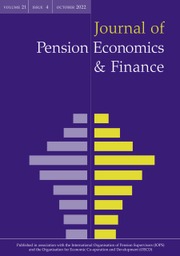Crossref Citations
This article has been cited by the following publications. This list is generated based on data provided by
Crossref.
Sebastian, Steffen P.
2003.
Liquidity Transformation: Open-End Versus Closed-End Funds.
SSRN Electronic Journal,
Dus, Ivica
Maurer, Raimond
and
Mitchell, Olivia S.
2003.
Betting on Death and Capital Markets in Retirement: A Shortfall Risk Analysis of Life Annuities Versus Phased Withdrawal Plans.
SSRN Electronic Journal,
Wang, Jin
Huaxiong, Huang
and
Milevsky, Moshe A.
2003.
Ruined Moments in Your Life: How Good are the Approximations?.
SSRN Electronic Journal,
Maurer, Raimond
2003.
Institutional Investors in Germany: Insurance Companies and Investment Funds.
SSRN Electronic Journal,
Gerrard, Russell
Haberman, Steven
and
Vigna, Elena
2004.
Optimal investment choices post-retirement in a defined contribution pension scheme.
Insurance: Mathematics and Economics,
Vol. 35,
Issue. 2,
p.
321.
Kiesewetter, Dirk
and
Thaut, Michael
2004.
Private Rentenversicherung, Besteuerung und adverse Selektion.
Zeitschrift für die gesamte Versicherungswissenschaft,
Vol. 93,
Issue. 2,
p.
221.
Gaudecker, Hans-Martin von
and
Weber, Carsten
2004.
Surprises in a Growing Market Niche: An Evaluation of the German Private Life Annuities Market.
The Geneva Papers on Risk and Insurance - Issues and Practice,
Vol. 29,
Issue. 3,
p.
394.
Piggott, John
Valdez, Emiliano A.
and
Detzel, Bettina
2005.
The Simple Analytics of a Pooled Annuity Fund.
Journal of Risk and Insurance,
Vol. 72,
Issue. 3,
p.
497.
Milevsky, Moshe A.
2005.
The Implied Longevity Yield: A Note on Developing an Index for Life Annuities.
Journal of Risk and Insurance,
Vol. 72,
Issue. 2,
p.
302.
Schmeiser, Hato
and
Post, Thomas
2005.
Life Annuity Insurance Versus Self‐Annuitization: An Analysis From the Perspective of the Family.
Risk Management and Insurance Review,
Vol. 8,
Issue. 2,
p.
239.
Sun, Wei
Triest, Robert K.
and
Webb, Anthony
2006.
Optimal Retirement Asset Decumulation Strategies: The Impact of Housing Wealth.
SSRN Electronic Journal,
Valdez, Emiliano A.
Piggott, John
and
Wang, Liang
2006.
Demand and adverse selection in a pooled annuity fund.
Insurance: Mathematics and Economics,
Vol. 39,
Issue. 2,
p.
251.
Gerrard, Russell
Haberman, Steven
and
Vigna, Elena
2006.
The Management of Decumulation Risks in a Defined Contribution Pension Plan.
North American Actuarial Journal,
Vol. 10,
Issue. 1,
p.
84.
Moore, Kristen S.
and
Young, Virginia R.
2006.
Optimal and Simple, Nearly Optimal Rules for Minimizing the Probability Of Financial Ruin in Retirement.
North American Actuarial Journal,
Vol. 10,
Issue. 4,
p.
145.
Post, Thomas
Gründl, Helmut
and
Schmeiser, Hato
2006.
Portfolio management and retirement: what is the best arrangement for a family?.
Financial Markets and Portfolio Management,
Vol. 20,
Issue. 3,
p.
265.
Orszag, J. Michael
2006.
Ruin in Retirement: Running Out of Money in Drawdown Programs.
SSRN Electronic Journal,
Stamos, Michael Z.
2007.
Optimal Dynamic Consumption and Portfolio Choice for Pooled Annuity Funds.
SSRN Electronic Journal,
Maurer, Raimond
and
Somova, Barbara
2007.
Handbook of International Insurance.
Vol. 26,
Issue. ,
p.
305.
Sun, Wei
Triest, Robert K.
and
Webb, Anthony
2007.
Optimal Retirement Asset Decumulation Strategies: The Impact of Housing Wealth.
SSRN Electronic Journal,
Stamos, Michael Z.
2008.
Optimal consumption and portfolio choice for pooled annuity funds.
Insurance: Mathematics and Economics,
Vol. 43,
Issue. 1,
p.
56.

